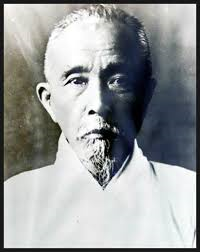
without saying
If you look at each other,
be of one mind
말하지 않아도 서로를 비춰보면
한 마음이어라.
The pen name is Weolnam. In 1881, when the government sent a shrine tour group to Japan, Park Jeong-yang recommended it as his source and inspected Japan's state affairs, which led to the idea of enlightenment. During this trip, Hong Yeong-sik and Hong Yeong-sik formed a close relationship. After returning to Korea, we urge them to make drastic innovations to prevent Joseon from falling behind the advanced empires. In 1884, the enlightenment groups established a modern postal system by opening the Postal Service, and when Hong Young-sik became the general manager of the Postal Service, he became the first Korean Postal Service investigator at his request. However, on December 4 of that year, when the Gaehwadang failed to cause the Gapsin Coup and Hong Young-sik was killed, he resigned from the party and left the country. When Park Jeong-yang was appointed as the first U.S. official in June 1887, he was appointed as the second secretary on his recommendation. When the Qing Dynasty refused to recognize Joseon's diplomatic sovereignty and tried to block the independent activities of the Joseon Corporation by saying that it would deliver King Gojong's letter to the U.S. president on his behalf, he was greatly angered by the negotiation with the Qing government officials and made Park Jeong-yang deliver the national books alone to practice independent diplomacy. However, in 1888 Cheongguk returned home after being summoned by the government under pressure from the Joseon government. The government has given way to other government posts, but has refused to return home. In July 1894, when the Gabo Police Department was established and the reform policy was implemented, Park Jeong-yang, the vice president of the school, became the director of the academic affairs bureau and played a leading role in the establishment of education schools, public middle schools, public elementary schools, and foreign language schools. He also served as the principal of a foreign language school and was encouraged to exclude Japan's interference in domestic affairs. He resigned from office again in February 1896, when the "Argument of Arguments" took place.
On July 2, 1896, Seo Jae-pil and Seo Jae-pil played a leading role in the founding of the Association for Independence and was elected as a member of the Central Committee, followed by the vice-chairman. The construction of Independence Gate, Independence Park, and Independence Hall was completed with Seo Jae-pil, and the "Discussion" was organized to enlighten the people. In February 1898, when Russia's Jeolyeongdo Island was allowed by the Chiro-Sugu-pa government, it filed an appeal against the declaration and held the Manmin Community in Jongno, Seoul with members of the Independence Association to succeed in interfering with Russia's internal affairs and defeating the demand for interests. Subsequently, he and members of the Association of Independent States launched a campaign against the exploitation of interests by the powers of the powers to prevent further interests. After continuing a campaign to reform the despotic monarchy by establishing a parliament, the independent association is not trying to establish a constitutional monarchy by the pro-Roh faction, but is arrested along with 17 comrades in a plot to establish a republic with President Park Jeong-yang, Vice President Yun Chi-ho, and Lee Sang-jae as internal alternatives. However, Seoul citizens will be released in about 10 days as they have strongly demanded the release of 17 leaders, including Lee Sang-jae. After the independence association was forcibly disbanded at the end of December 1898, it was buried at the beginning of the night and did not enter any government posts. In 1902, he was imprisoned for two years after he was forced into the Reform Party while discussing the reform of state affairs with his comrades from the former Independence Association. In 1905, Japanese 「 the Eulsa Treaty to force 」 with deprivation, its sovereignty with Christian Patriot to provide full support to the Enlightenment. In April 1907, he joined the New People's Association and served as a senior member. In 1908, he took office as the head of the religious department of the Hwangseong Christian Youth Association and as the head of the Education Ministry, and played a decisive role in breaking down the political maneuvering to make the Korean Christian community pro-Japanese, led by the Dong-A Christian Association, which was dispatched from Japan at the time, and in favor of the Christian community in the restoration of national sovereignty. Under his leadership, the movement has achieved great results, prompting the Japanese Resident-General to fear Christian forces as anti-Japanese independence forces. When the Japanese colonists invaded Korea in August 1910, they were mainly engaged in the Christian Youth Movement to cultivate their ability to restore national sovereignty. In April 1911, he took office as the head of the religious department of the Hwangseong Christian Youth Association and worked hard to crush the Japanese policy of subjugating the Korean Christian Youth Association with his comrades, including Namgung Eok. In addition, he/she will conduct lectures to promote national awareness and to establish a foundation for the independence movement by organizing Buddhist Youth Association, Cheondogyo Youth Association, and religious organizations.
expert opinion
Weolnam: Lee Sang-jae 1850-127
Seocheon, South Chungcheong Province
In 1881 (the 18th year of King Gojong's reign), a gentleman's cruise team visited Japan as a member of Park Jeong-yang's entourage and encountered the idea of enlightenment.
Youth enlightenment through the YMCA, religious organizations, founding of the Joseon Education Association, etc.
He led the need for education, including Japan's oppression of the press and criticism of colonial policies.
You're one of 33 independence fighters.
one's heart and silence.
If you don't say anything but look at each other, keep in mind.
circumstances of collection
Relics of Jang Sung-soo
